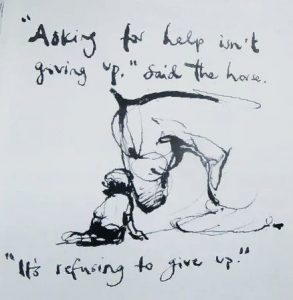WHY IS IT SO DIFFICULT TAKING HELP?

‘No man is an island…..’
John Donne’s 400-year old poem still resonates in today’s time to drive home the point of interconnectedness specially at work. We all need help at work from time to time, but it’s not always easy to say so. No matter how far you’ve progressed in your career, or how much seniority you have, you may worry about coming across as incompetent or weak if you ask for assistance – and you are not alone in harbouring these thoughts.
But what is it that stops us from seeking the help that we need?
If you are in a competitive work environment, other than coming across as weak, there is also a fear that this information about you not knowing will be used against you. And, on the other hand, if you’re too open about asking for help, people may start associating you as someone who is not able to get anything done on his own and that will make you appear incapable in front of your peers. However much you would like to play it equitably, the reality is that not everyone thinks of it the same way.
If you do not ask for help, or not ask for it the right way then it could put your reputation at stake. You might feel less confident about your abilities and worry about what others think of you.
Seeking support is no sign of weakness. And, it can well make the difference between failure and success. When sought the right way, it can position you as someone with self-awareness, confidence, and an understanding of shared goals.
Further, drawing on other people’s skills and experience can benefit you and your organization too.
When you do ask for help, be clear, confident and prepared. Choose the right method of communication and be sure to show your appreciation. As a manager and a leader you need to provide a psychologically safe environment so that people feel safe in asking questions without the fear of being ridiculed or scoffed. It should be seen as part of a learning environment. Many school classrooms are now adopting this strategy to encourage better learning for their students.
Let’s meet Mira
I have a friend Mira who is a successful Executive Director with a leading corporate organization and heads a team of 30 at age 42.
When I asked her the secret of staying focussed on her goals and career progress, she tells me that she has a life coach and a woman mentor. She takes regular sessions with both who help her through different aspects of her life.
‘Is it counselling?’ I ask Mira
‘Not totally’ she answers
For Mira, the purpose of having a life coach is to get a perspective on her life goals and revisit areas of her life that she may have neglected. Her purpose to have a woman mentor in addition is to have a focus on her career goals and ambitions with a guide who can help her navigate challenging situations and advance her professional journey successfully.
She see’s having a life coach and a mentor as a supplement to her success, and not as a sign of weakness.
We’re Seeing It All Wrong ?
Now, this really got me thinking of when I was at that age and stage in life.
I never had the confidence to seek help from anyone. Why? Because it was automatically assumed that taking counselling, asking for advice or meeting a life coach meant that something has happened in your life that isn’t good. It would have been presumed that I was at some dead-end in my life or reached some dire strait to seek a change in my circumstances.
So can we turn it around? Then seeking ‘help’ in the form of counselling, coaching or mentoring becomes a positive act and meeting someone for these sessions would be hugely empowering and helping you grow. It would simply mean that it is part of my self -development that is very much encouraged and enables an improvement in my overall well-being.
So now we can embrace seeking help in the secure knowledge that it is a perfectly normal thing to do.
In Mira’s case, having a life coach helped her plan her life clearly. With the help of her mentor, she was able to climb the career ladder well.
Mira has many responsibilities to attend to in addition to being a Mother and a wife. Mira’s life coach is her accountability partner and helps steer her to fulfil her life’s ambitions. Her mentor offers new insights to problems or situations that Mira may encounter at work.
Having a support system like this has amazing positive benefits – well-being, better coping skills and a good work-life balance. You are taking control of your life in a better way.
And, if you’re at a point in life where you’re wanting some change to happen, or want to improve or upgrade the quality of your life then do seek the help that can catalyse that change. All you have to do is ASK!
